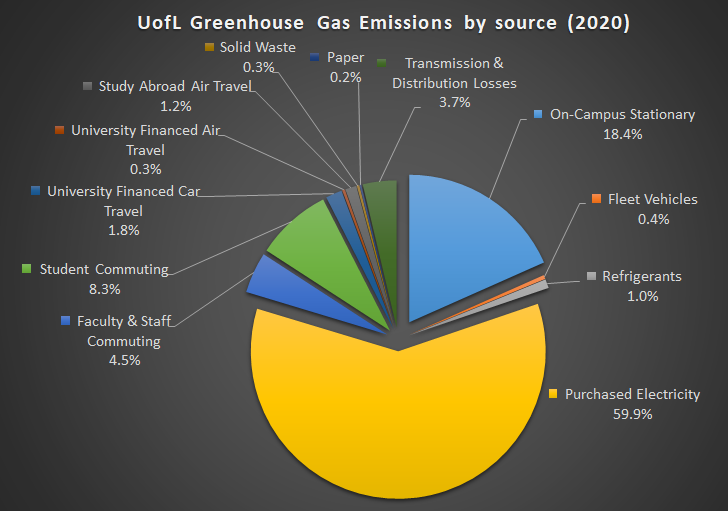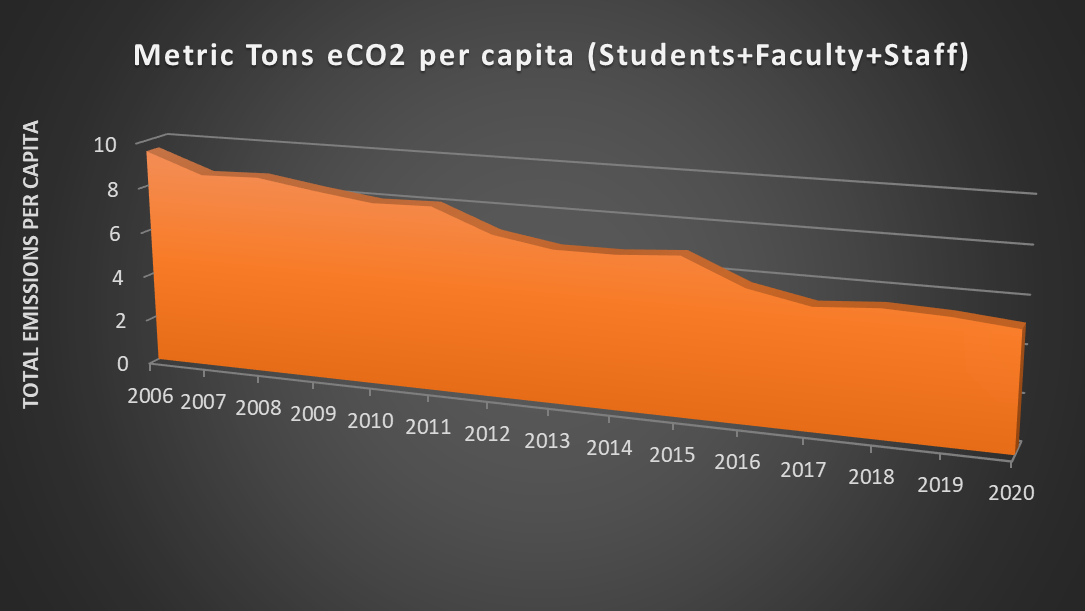UofL Carbon Emissions Down 35%
On May 1, 2021, UofL released its 2020 Greenhouse Gas Emissions Report, which documents that, following several years of swift reduction in pollution, our emissions have essentially stabilized with little progress since 2017, when the Climate Action Plan implementation budget was slashed to a minimal operating level of $45,000/year (25% of historical funding levels). The good news is that we were able to exceed our first milestone goal of a 20% emissions reduction by 2020 from our 2008 baseline.
 Our efforts to implement our Climate Action Plan (CAP) continue to pay off. While we have made great strides in the last decade, our progress has stalled and without larger investments, we have not been able to achieve some of our key goals in the CAP, such as sourcing 20% of our energy from renewable sources by 2020. In fact, UofL’s renewable energy systems accounted for only 3.67% of our energy needs (excluding vehicle fuels) in 2020. Even with a 52% decrease in air travel, a 75% decrease in university-funded rental car mileage, and a 59% decrease in solid waste production due to the pandemic, UofL’s net emissions decreased only 3.5% from 2019 to 2020. While any reductions in emissions should be celebrated, the latest science on the global climate crisis suggests that we must take even more aggressive action to cut emissions if we are to avoid the worst effects of runaway climate change.
Our efforts to implement our Climate Action Plan (CAP) continue to pay off. While we have made great strides in the last decade, our progress has stalled and without larger investments, we have not been able to achieve some of our key goals in the CAP, such as sourcing 20% of our energy from renewable sources by 2020. In fact, UofL’s renewable energy systems accounted for only 3.67% of our energy needs (excluding vehicle fuels) in 2020. Even with a 52% decrease in air travel, a 75% decrease in university-funded rental car mileage, and a 59% decrease in solid waste production due to the pandemic, UofL’s net emissions decreased only 3.5% from 2019 to 2020. While any reductions in emissions should be celebrated, the latest science on the global climate crisis suggests that we must take even more aggressive action to cut emissions if we are to avoid the worst effects of runaway climate change.
The lack of progress since 2017 is troubling, but it is not unfamiliar territory for UofL. We have been here before and we have righted our ship. In fact, we saw an increase in emissions from 2013 to 2015 and took action to reverse the trend. By continuing to invest in efficiency and behavior change, in 2016, the university was able to achieve a 15% reduction of carbon emissions in one year. This is a vital investment for the sake of our students’ futures, and, indeed, for our common future.
When we look over the long-term, UofL can be very proud of the fact that we have reduced our carbon emissions, even as we continue to grow in terms of physical size, campus population, and budgetary expenditures. In fact, UofL has achieved the following relative reductions in emissions over time:
| Per sq. ft. of building space |
Per Capita (Students+Employees) |
Per Operating Budget Dollar |
|
|---|---|---|---|
| Emissions Reduction 2008-2020 | 49% | 41% | 45% |
From 2008 to 2020, we estimate that UofL’s net carbon emissions have declined by 35.35% from 218,540 to 141,279 metric tons/year.
Given that the social cost of carbon is at least $40/ton of carbon emissions, UofL's emissions in 2020 were still responsible for no less than $5.7 million/year in damage to our planet and its people. It is not acceptable or in line with our CARDINAL principles to continue externalizing these costs and imposing such a debt on the future generations for whom UofL ought to be a source of hope and flourishing.
In 2020, we stood at an 35.35% reduction from the 2008 baseline. UofL decreased emissions by 77,261 metric tons of CO2 equivalent per year since 2008. According to the EPA's greenhouse gas equivalencies calculator, this translates to:
- Taking 16,803 cars off the road, or over 194 million miles of driving, or 8.7 million gallons of gas burned;
- 26,279 tons (or 3,754 garbage trucks) of waste recycled instead of landfilled;
- Emissions from 9,304 average U.S. homes’ annual energy use;
- 426 rail cars worth of coal burned;
- Over 2.9 million incandescent lamps switched to LEDs; or the
- Carbon sequestered by 94,658 acres of U.S. forests in one year (or 1.3 million tree seedlings grown for 10 years).
 While this reduction is important and laudable, this is no time for complacency. While the reductions to date are certainly worthy of note and should be celebrated, they still do not represent a steep enough decline to achieve our goal of climate neutrality by 2050. We must remain vigilant, committed, and willing to invest resources in order maintain our progress and to ensure a sustained effort toward our ultimate goal of climate neutrality by 2050. We must continue to invest in emissions reduction, to innovate solutions that work in our unique urban setting, and to prioritize efficiency, behavior change, transportation alternatives and renewable energy.
While this reduction is important and laudable, this is no time for complacency. While the reductions to date are certainly worthy of note and should be celebrated, they still do not represent a steep enough decline to achieve our goal of climate neutrality by 2050. We must remain vigilant, committed, and willing to invest resources in order maintain our progress and to ensure a sustained effort toward our ultimate goal of climate neutrality by 2050. We must continue to invest in emissions reduction, to innovate solutions that work in our unique urban setting, and to prioritize efficiency, behavior change, transportation alternatives and renewable energy.
The most important steps that UofL needs to take in the near-term are:
- Invest in a new energy-savings performance contract for energy efficiency, renewable energy, and behavior change measures at the scale of our $52M 2009-2017 performance contract.
- Invest in large-scale renewable energy, both on-campus (as in an anaerobic biodigestor) and off-campus (as through a virtual power purchase agreement).
- Prevent a return to pre-pandemic levels of driving through a Transportation Demand Management Plan that incentivizes alternatives (including virtual), caps parking, and transitions UofL from subsidizing annual parking permits to market-rate, pay-per-use parking that subsidizes alternatives.




